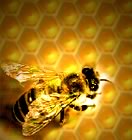| |
HONEY
 Brief
History Brief
History
Honey is the oldest sweet known to man. An English proverb says, ‘The
history of honey goes with the history of mankind.’ In the
Aranha Caves near Valencia, Spain, 9,000 year old mural paintings
show a man
gathering honey from a cliff face whilst being attacked by the bees.
Similar murals have also been found in South Africa and India. In
ancient times, honey has been mentioned in the writings of the Sumerians,
the
Babylonians, the Indians and the Egyptians. Both the Egyptians and
the Ancient Greeks used honey as a sweetener and also used it in
their religious
ceremonies. For thousands of years Honey has transcended all cultures
and has been associated with wealth, happiness, beauty and longevity.
Its therapeutic properties have been renowned to strengthen, nourish
and care for the physical body.
Today, more honey is produced and consumed than ever before and
research into its beneficial properties is being carried out throughout
the
world. Islam accords honey a special place and encourages its use
for a healthier
lifestyle.
The Honey Bee
Bees are responsible for 80% of all pollination and can pollinate
as many as 18,000 flowers a day! They may travel as far as 55,000
miles
and visit more than 2 million flowers to gather up enough nectar
to make just 1 pound of honey! They are able to navigate across
long
distances to locate sources of nectar and then return to the hive
and communicate
directions to fellow bees.
They prepare special food items such as royal jelly and beebread
for their young. They protect their home by recognising and repelling
intruders. They regularly remove garbage and other refuse from their
hive.
They control the climate in the hive by ‘fanning' fresh air.
They also sprinkle water during the summer and cluster together
for warmth
in the winter. When their hives become overcrowded, they are smart
enough to know that some have to leave and establish new colonies.
The honey bee is smarter than today's most powerful supercomputers.
While computers can carry out over 16 billion simple operations
a second (such as adding two numbers), the honey bee performs the
equivalent
of 10 trillion operations per second!
Production
Each bee colony consists of the Queen Bee, Drones ('the idle bachelors')
and the workers (foragers). The worker bee stores the nectar it
collects from the flowers in a special nectar 'sac' where special
enzymes transform
the sucrose of the nectar into the simple sugars fructose and glucose.
Each bee carries up to half its own weight in nectar and flies at
around 15 mph. When the forager returns to the hive, it delivers
the nectar
to one of the indoor bees. It is then transferred mouth-to-mouth
from bee to bee until the moisture content is reduced from about
70 percent
to less than 20 percent. This changes the nectar into honey. It
is estimated that a worker bee will literally work itself to death
in
six weeks!
Composition
The excess of the colony's requirements are extracted by humans
for use as food. Liquid honey is approximately as sweet as sugar
yet has
17% less carbohydrate and is over 90 calories less per each 100g
and contains no fat! The average composition of honey contains carbohydrates,
minerals, vitamins, amino acids, acids, and antioxidants including
Pinocembrin, which is unique to honey.
The Average Composition of Honey
Vitamins- Thiamin, RiboflavinNiacin, BiotinB-6, B-12, C, A, D, E,
Pantothenic Acid, Folate
Carbohydrates- Fructose, Glucose, Maltose, Sucrose, Kojibiose, Turanose,
Isomaltose, Maltulose, Erlose, Theanderose, Panose
Minerals- Water, Sodium, Calcium, Iron, Zinc, Potassium, Phosphorous,
Magnesium, Selenium, Copper, Chromium, Manganese
Acids & Enzymes- Invertase, Amylase, Glucose Oxidase, Catalase,
Acetic and at least 8 other organic acids. Proline and at least 18
other free amino acids.
Antioxidants- Pinocembrin, Pinobanksin, Chrysin, Galagin
Research & Benefits
Several studies have recently shown the unique properties of honey
as a natural remedy. Honey has been shown to have special antimicrobial
and antibacterial components, which can help prevent infections
by inhibiting the growth of certain bacteria.
It is also an antioxidant, especially in the darker honeys and those
with higher water content and may help eliminate reactive compounds
in our bodies called ‘free-radicals’. These are believed
to contribute to many serious diseases when left unchecked.
It is also a humectant, which means that when honey is exposed to
air it draws in and retains moisture. When used in cosmetics it
can help hydrate the skin making it feel fresh and ideal for moisturising
products. Furthermore it may help in the prevention of scarring
by
keeping the skin moist and helping in the growth of new tissue.
Honey provides the body with quick energy, which can help in recuperation
and help recover from fatigue. Honey has been shown to be an excellent
post-exercise muscle recuperation and energy repletion supplement
maintaining optimal blood sugar levels throughout the two hours
following exercise.
Research around the world has shown that honey is an effective treatment
for serious wounds and burns and the use of honey, as a wound dressing
material, an ancient remedy that has now been rediscovered. In the
past and increasingly today, it is being used as a natural remedy
for several ailments. Studies are currently being carried out on
the effect of honey on preventing tooth decay, allergies, treating
ulcers,
thwarting disease and ageing.

DISCLAIMER:
The Muslim Health Network would like to advise parents and those in
charge of babies, not to give honey to
babies under one year of age. Honey may contain bacterial spores
that can cause infant botulism - a rare but serious disease that affects
the nervous system of young babies (under one year of age). Botulism
spores are common and may be found in dust, soil and uncooked foods.
Adults and children over one year of age are
routinely exposed to these spores but not normally affected by them. Honey as
a food for older children and adults remains safe if consumed in moderation.
In some cultures honey is given to the newborn baby, this is ill-advised and
should be avoided. For those suffering from diabetes please consult your doctor
before consuming honey.
|
|



![]()


